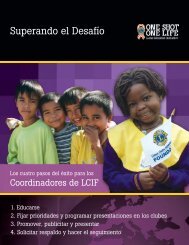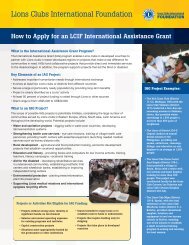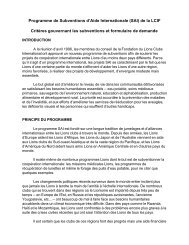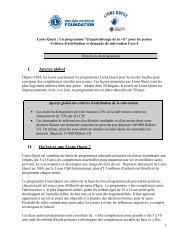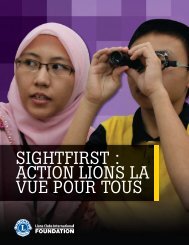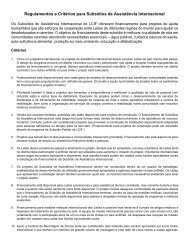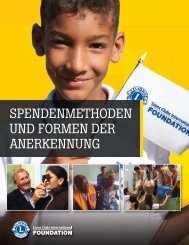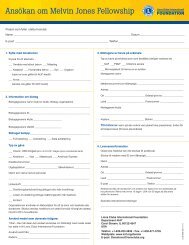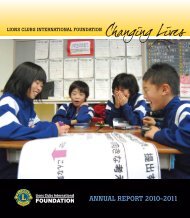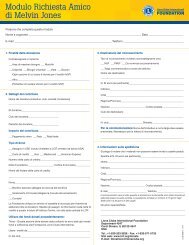ForSight Magazine - LCIF
ForSight Magazine - LCIF
ForSight Magazine - LCIF
You also want an ePaper? Increase the reach of your titles
YUMPU automatically turns print PDFs into web optimized ePapers that Google loves.
October 2011<br />
SightFirst China Action Begins New Phase<br />
Focusing on Low Vision and Trachoma<br />
Lions Clubs International Foundation (<strong>LCIF</strong>) is a leader in providing<br />
support for preventing avoidable blindness and restoring sight for<br />
people around the world. In China, the SightFirst China Action (SFCA)<br />
program has become one of <strong>LCIF</strong>’s largest and most successful<br />
campaigns. While the first two phases of SFCA met goals to help<br />
prevent blindness on a large scale through the treatment of cataract<br />
and improvement of other services, Lions will help even more people by<br />
launching a new phase of the program.<br />
There is a great need for sight<br />
programs in China; it is estimated that<br />
more than 20 percent of those blind<br />
from cataract in the world live in China,<br />
and every year there are 400,000 new<br />
cases. One cause of this continued<br />
increase is that a large number of township<br />
and county hospitals do not have<br />
ophthalmology clinics nor adequately<br />
trained manpower and equipment.<br />
To address blindness prevention<br />
needs of mainland China, SFCA was<br />
formed as a partnership between Lions<br />
Clubs International and the People’s<br />
Republic of China. To date, <strong>LCIF</strong> has<br />
awarded two SFCA grants and they<br />
have proven to be among the most important in the history of<br />
the Lions’ SightFirst program. Covering activity since 1997, the<br />
Foundation has invested more than US$30.8 million in funding for<br />
more than 5 million cataract surgeries and the strengthening of<br />
more than 300 eye care institutions. These funds were matched<br />
by US$200 million from the Chinese government. The accomplishments<br />
of the China projects are reflected in the establishment<br />
of Lions clubs in mainland China, making LCI the first international<br />
volunteer service organization in the country. The current strength<br />
of LCI in China and Hong Kong is 10,587 members in 396 clubs,<br />
and growing.<br />
When the bandages were removed from the eyes of Ge Sang, she<br />
was moved to tears and expressed her appreciation. “Thanks for curing<br />
my eyes,” she said. The 77-year-old woman is just one of the millions<br />
of people who have received sight through SFCA. Sang became blind<br />
from cataracts five years ago, and her eight-year-old relative was forced<br />
to look after her. Yet, due to free operations offered on behalf of SFCA,<br />
Sang now has restored sight and is once again living a full life.<br />
At the May 2011 SightFirst Advisory Committee meeting, a third phase<br />
of the partnership was approved through a US$2.67 million grant. This<br />
includes an initial grant for US$1.6 million for trachoma. SightFirst funds<br />
will be used to help the Chinese government eliminate blinding trachoma<br />
as a significant health problem.<br />
“We are excited to continue and expand our vision and humanitarian<br />
services throughout China,” said <strong>LCIF</strong> Chairperson Sid L. Scruggs, III.<br />
“Lions in China have a great record of reducing blindness, and we are<br />
now looking to reach even more people in need through several new<br />
initiatives.”<br />
Another component of the third phase will involve SightFirst and<br />
local Lions developing two Lions low vision centers in China. Statistics<br />
provided by the Chinese government<br />
show that approximately 20,000 low<br />
vision aids and rehabilitation services<br />
are provided each year in China, while<br />
the total number of people with low<br />
vision is 7 million. These new low vision<br />
centers will be staffed by professionals<br />
trained through SightFirst grant funds,<br />
as well as provided with a range of eye<br />
examination devices, low vision aids<br />
and vision equipment. The government<br />
plans to establish, on a pilot basis,<br />
low vision centers in Guangdong and<br />
Liaoning provinces. Lessons learned<br />
from these pilot projects will then be<br />
incorporated into a nationwide<br />
expansion plan. The<br />
formal inauguration of the<br />
Lions low vision center in<br />
Shenzhen will be a part of<br />
Lions World Sight Day 2011.<br />
Finally, SightFirst will support<br />
a project in Liaoning<br />
Province that will help better<br />
link primary, secondary and<br />
tertiary eye care institutions.<br />
It is the hope that the project<br />
will demonstrate that highquality<br />
eye care (currently available to urban populations) can be<br />
provided to rural areas. Funds will be used for needed equipment and<br />
eye care personnel training. The Liaoning government expects that the<br />
lessons learned will be translated by the provincial government into<br />
action throughout the province.<br />
These projects are possible through funds raised from Campaign<br />
SightFirst II. Lions continue to focus their efforts on projects and<br />
programs that target the leading causes of the blindness but are also<br />
beginning new projects that will address new and emerging threats<br />
to sight.
Lions, Perkins School for the Blind<br />
Help Children in the Philippines<br />
In the Philippines, less than 5 percent of<br />
children who are visually disabled go to<br />
school. SightFirst is joining with Perkins<br />
School for the Blind to ensure all children<br />
have the opportunity to attend school and<br />
fulfill their potential.<br />
A lack of ability to handle visually disabled<br />
children in schools combined with a<br />
lack of awareness in the community of the<br />
rights and educational needs of these<br />
children are the main roadblocks to opportunity<br />
and independence. To combat these<br />
challenges, SightFirst and the Lions of the<br />
Philippines are collaborating with Perkins<br />
School for the Blind and local partners<br />
to promote inclusive education and help<br />
school systems better accommodate<br />
students who are blind or visually disabled,<br />
including those with additional disabilities.<br />
<strong>LCIF</strong>’s SightFirst program traditionally<br />
helps to fund projects that fight the major<br />
causes of blindness and improve the lives<br />
of individuals who are visually disabled. As a<br />
result of fundraising efforts from Campaign<br />
SightFirst II, Lions are now expanding their<br />
SightFirst programs to include new programs<br />
aimed at individuals with low vision<br />
and who are visually disabled. The Philippines<br />
project, focusing on the Luzon region,<br />
“The Lions have a longstanding<br />
reputation as agents of change<br />
for people around the world<br />
who are visually disabled.”<br />
has special significance as the Foundation’s<br />
first SightFirst grant awarded for work in<br />
education and rehabilitation.<br />
“We are honored to join <strong>LCIF</strong> on this<br />
new endeavor,” said Perkins School for the<br />
Blind President Steven Rothstein. “The<br />
Lions have a longstanding reputation as<br />
agents of change for people around the<br />
world who are visually disabled. As the<br />
school that educated Helen Keller and her<br />
teacher Anne Sullivan, Perkins believes<br />
that when given opportunity, an individual’s<br />
potential to overcome obstacles and<br />
contribute to the greater community is<br />
limitless. We are excited to work alongside<br />
the Lions and create greater possibilities<br />
for children and their families in the<br />
Philippines.”<br />
Through expanding educational opportunities<br />
and empowering parents as advocates<br />
for their children, the SightFirst<br />
Philippines project will lay a foundation for<br />
broader social inclusion throughout the<br />
region. When communities witness the<br />
achievements of children with disabilities<br />
who are given the opportunity to attend<br />
school, stigmas and discrimination will<br />
begin to dissolve.<br />
Parents are the best advocates for their<br />
The following are examples of visually disabled children who have been helped through <strong>LCIF</strong> and SightFirst’s<br />
partnership with Perkins School for the Blind. The program is made possible through funds raised from Campaign<br />
SightFirst II, and the project represents the first SightFirst grant awarded for work in education and rehabilitation.<br />
Jelbert:<br />
Jelbert and his brother, Jericho, both have congenital cataract and<br />
were both referred to the Resources for the Blind, Inc. (RBI)-Davao<br />
Medical Coordinators for cataract surgery. While awaiting surgery,<br />
both boys were enrolled in RBI’s Early Intervention and Rehabilitation<br />
Program so that they could develop motor, cognitive and communication<br />
skills. When he first arrived, Jelbert was not able to participate<br />
in activities with his friends at preschool because he lacked communication<br />
and play skills. Despite living in a metropolitan city in the<br />
Philippines, there were almost no educational services available for<br />
children like him — children who are blind with additional disabilities.<br />
Now, through the Perkins Possibilities for Children/Philippines<br />
(PPCP) Project, Jelbert has a personalized educational program that<br />
promotes pre-speech and communication skills and emphasizes<br />
learning activities that improve his playing skills. Jelbert has eagerly<br />
learned a variety of verbal instructions and cues that allow him to<br />
participate with his peers in group activities.<br />
2
children’s rights. Marie Alonzo, whose son John is visually<br />
impaired with mild autism, has been a member of Parent Advocates<br />
for Visually Impaired Children (PAVIC) since 2004 and is immediate<br />
past president of PAVIC. “Every parent worries about what will<br />
happen to their children if they are left alone,” says Marie. “With<br />
PAVIC’s program, I am confident that I can prepare John well.”<br />
The Lions of Multiple District 301, PAVIC and Perkins are also<br />
working together, along with Resources for the Blind, Inc. (RBI), to<br />
increase local public awareness for visually disabled children. As<br />
an organization, RBI coordinates a range of education, training and<br />
health programs for children and adults with visual disabilities. It<br />
is the premier non-governmental organization working toward<br />
inclusive education for children who are visually disabled in the<br />
Philippines. RBI collaborates with parents through PAVIC and<br />
works through partnerships with Perkins, the Department of<br />
Education, teachers, administrators and government representatives<br />
to foster quality inclusive education in the Philippines. Together,<br />
they are coordinating three parent workshops each year on topics<br />
including advocacy, parent leadership skills and education of<br />
children with visual disabilities.<br />
In school, successfully including children with disabilities<br />
depends upon the skill and knowledge of teachers. In the Philippines,<br />
there is a severe shortage of teachers and administrators with<br />
proper training to work with students who are visually disabled.<br />
During the course of this three-year project, 60 educators will<br />
complete a university teacher training program and 60 school<br />
administrators will receive training to ensure administrative support<br />
for inclusive education throughout school systems. In addition,<br />
420 teachers will strengthen their capacity to serve children with<br />
visual disabilities through short-term training courses.<br />
To further improve access to quality education, Perkins International<br />
staff and consultants will share their expertise through<br />
advanced training for teachers each year, including site visits and<br />
curriculum development. A National Teacher’s Conference will<br />
bring together teachers, administrators, government officials and<br />
university faculty to share knowledge and strengthen the network<br />
of special education professionals throughout the region. The<br />
project will also help the Philippine Printing House for the Blind<br />
increase production of Braille textbooks, enabling students with<br />
visual disabilities to learn alongside sighted peers and not fall<br />
behind in their studies due to lack of appropriate teaching materials.<br />
<strong>LCIF</strong> is helping address this problem through several new<br />
programs made possible by funds raised from Campaign Sight-<br />
First II. To further leverage these efforts, <strong>LCIF</strong> is also working with<br />
a number of corporate and NGO partners.<br />
In the Philippines, Lions and Johnson & Johnson’s Sight for<br />
Kids program have an early identification system that screens<br />
school children and finds those with vision impairments and gets<br />
them connected to the services they need. What is missing is<br />
finding the children who are outside the school system. Local<br />
Lions clubs members will play key roles in developing and<br />
implementing child-finding activities in their respective communities<br />
and in gaining local support for inclusive special education<br />
programs from government officials and civil society. This project<br />
will also train 30 local low vision professionals, who will provide<br />
clinical and functional low vision assessments to students. With<br />
appropriate low vision evaluations and recommendations, teachers<br />
will have the information they need to make appropriate classroom<br />
modifications and help students reach their full potential.<br />
Before 1990, less than 300 children with visual disabilities<br />
attended school across the Philippines. Last year, nearly 3,000<br />
children were enrolled in schools in almost every province in the<br />
country, but thousands of children and families have yet to be<br />
reached. Working together, Lions and Perkins are committed to<br />
reaching those children.<br />
Rican, “Adi”:<br />
Rican Uy, playfully known by her family as Adi, is one girl who<br />
has thrived thanks to educational services through Perkins<br />
School for the Blind and Lions’ local partners. Shortly after Adi’s<br />
birth, her mother spent endless hours in doctor’s offices. Ms. Uy<br />
was overwhelmed by the variety of diagnoses and had minimal<br />
expectations for Adi’s future. By age three, Adi began working<br />
with an occupational therapist. When she was 8 years old, Adi<br />
was referred to Resources for the Blind, Inc. (RBI). Through RBI’s<br />
program, Adi successfully learned skills for daily living. She<br />
requires minimal assistance getting ready for school in the<br />
morning and—to her mother’s delight—has even asked to start<br />
helping with house chores. Adi loves to sing and drum; in fact,<br />
Ms. Uy says Adi will drum anything she can find a good sound<br />
from with her hands. Due to her accelerating growth, Adi is now<br />
enrolled in a special education program under an RBI trained<br />
teacher. Today she is developing pre-Braille skills.<br />
3
Lions Continue Emphasis on<br />
Cataract Programs in Sri Lanka<br />
In Sri Lanka, cataract is the leading cause of blindness.<br />
Piyadasa Hewavithana, aged 63, is one of 16,500 Sri<br />
Lankans who have the Lions to thank for regained sight<br />
through cataract surgery. Once nearly blind, he now enjoys<br />
reading the newspaper and is able to once again work. “My<br />
sincere thanks to the doctor and staff of the Lions Hospital<br />
at Panadura for providing free vision for poor people who<br />
would otherwise go blind. I have got a new life. I wish that<br />
Lions will help many more poor people to get their sight<br />
back.”<br />
Cataract is a clouding of the lens of the eye, which<br />
impedes the passage of light. Most cases of cataract are<br />
age-related and progress slowly to cause vision loss. This is<br />
potentially blinding if untreated, and is a leading cause of<br />
visual impairment. In spite of progress made with surgical<br />
treatments in many parts of the world, 18 million people<br />
experience cataract blindness, representing 48 percent of all<br />
cases of blindness. Cataract is a leading<br />
cause of blindness in developing<br />
countries where surgical services are<br />
often inadequate or inaccessible. Even<br />
where surgical services are available,<br />
there is often a long waiting period for<br />
operations, shortages of supplies and<br />
transportation problems that impede<br />
access to the underserved. There is<br />
currently no way to prevent cataract, but<br />
surgery is a viable option for treatment.<br />
In May 2009, Sri Lanka emerged<br />
from a 26 year-long civil war. There<br />
was a severe shortage of resources for<br />
health care. Despite this, SightFirst<br />
was able to play a positive role in the development of the eye care<br />
system in the country. Between 1993 and 2008, SightFirst provided<br />
nearly US$1.8 million for Lions to help improve the lives of the less<br />
fortunate in their communities. In addition to surgeries, eye care<br />
wings were constructed at three government hospitals, four government<br />
eye wings were upgraded, and three Lions eye hospitals<br />
were supported through infrastructure development, human<br />
resource training and cataract subsidies.<br />
Dr. S. Chandrashekar Shetty, SightFirst Technical Advisor for Sri<br />
Lanka, has noted that the “Lions of Sri Lanka have joined hands<br />
with National and Provincial Governments of Sri Lanka, other<br />
national and international NGOs, voluntary organizations and civil<br />
society in providing need-based, comprehensive, quality eye care<br />
services in the underserved population of Sri Lanka in the last two<br />
decades.”<br />
As the leading cause of blindness in Sri Lanka, Lions continue<br />
to focus on cataract surgeries. One of the indicators used to<br />
determine the degree to which cataract is being addressed is the<br />
cataract surgical rate, or the number<br />
of cataract surgeries being carried<br />
out by all eye care providers, per<br />
million population. According to data<br />
just released, the Sri Lankan average<br />
is 3,804, but this number fluctuates<br />
wildly between the 25 districts of<br />
Sri Lanka, with figures ranging from<br />
571 to 8,889. These figures will help<br />
guide Lions eye hospitals to reach<br />
the underserved areas.<br />
The Lions are planning to expand their outreach beyond the<br />
greater Colombo area in Sri Lanka and have started working with<br />
the Ministry of Health and VISION 2020, a global collaboration of<br />
eye care NGOs, on playing a proactive role in building the eye care<br />
systems in other parts of the country. They have explored partnering<br />
with the government hospitals in Jaffna, Trincomalee and<br />
Batticaloa to upgrade those government hospitals. Also a newlyconstructed<br />
Lions eye hospital in Ratnapura, financed through a<br />
SightFirst grant and a generous donation by the Lions of Finland<br />
and their government, will address eye care needs in another<br />
underserved part of the country.<br />
Through these efforts, Lions can make Hewavithana’s wish a<br />
reality by “helping many more poor people to get their sight back.”<br />
4
SightFirst Funds in Action<br />
In Sri Lanka, 16,500 people have regained sight through cataract surgeries thanks to<br />
Lions. The following are patient interviews from SightFirst’s cataract surgery operations<br />
at Lions Gift of Sight Hospital in Panadura, Sri Lanka:<br />
E. W. David, farmer:<br />
I am a farmer and have been working on a leased farm for the<br />
last 35 years. Since last year, my sight has been failing, and I<br />
was almost blind. My son took me to the government hospital<br />
at Matara six months ago. The hospital eye doctor wanted me<br />
to purchase a lens and a list of other items which I could not<br />
afford. My son had seen a banner in Matara at the main temple,<br />
that there was going to be a free eye cataract camp, organized<br />
by a Lions Hospital in Panadura and the Lions Club of Millennium<br />
Ladies.<br />
My son took me to the camp. The eye doctor selected me after a number of tests,<br />
and wanted to know whether I was prepared to undergo surgery in early September. I<br />
was only too happy to.<br />
In the morning, the bus came and brought all of us (26) to the Lions Hospital in<br />
Panadura. I cannot express in words the manner in which doctors and nursing staff<br />
looked after us. Our food and stay in the hospital was free. When my bandage was<br />
removed and dressed again, I fell down on my knees and thanked the doctor, staff and<br />
the Lions club members. I could see. The doctor gave me instructions how to look<br />
after myself and gave me drops to be used. This too was free.<br />
This is the first time I knew that Lions are involved in free cataract surgery. The doctor<br />
told me that I would be blind within six months if this surgery was not done.<br />
When I go back today, my family will never believe that I can now see. I was a drag<br />
on the lives of my children and wife. God saw my suffering, through the Lions, and<br />
gave me the most valuable gift that a man can have. Please convey my grateful thanks<br />
to Lions who gave me the sight to complete my life in happiness. God Bless the Lions.<br />
Piyadasa Hewavithana, casual worker:<br />
I am a casual (temporary) worker from Akurassa. I am 63 years<br />
old and have to support three members in my family.<br />
Before, I was almost blind; I could not see to read a newspaper<br />
or travel alone on the road. I started working in the temple. The<br />
priest, knowing my predicament, provided meals for me and my<br />
children. Though I had the physical strength to work, no one<br />
wanted to employ me, saying that I was a blind man.<br />
The priest, having received information from the Akurassa<br />
Lions Club, arranged for me to be taken for this Lions Camp at Matara, which was 55<br />
kilometers (34 miles) from my home.<br />
The Lions arranged for me to be taken to the Lions Hospital in Panadura. So I am<br />
here in the generous hands of the Lions Hospital. I never could believe the great<br />
humanitarian sacrifice these Lions, doctors and nurses are doing. We have all our<br />
meals, lodging, medical assistance and surgery totally for free.<br />
I do not have words to thank everyone. I can now see. When the bandages were<br />
removed this morning and re-dressed, I was given eye drops for free. I am told that I<br />
need to be careful for at least one month. My sight will improve, and I will be able to<br />
see very well.<br />
My sincere thanks to the doctor and staff of the Lions Hospital at Panadura for<br />
providing vision care free for poor people who would otherwise go blind. I have got a<br />
new life. I pray that Lions will help many more poor people to get their sight back.<br />
Lions’ timely intervention saved my sight. Thank You.<br />
Expanding Low<br />
Vision Services<br />
in Kansas, USA<br />
A grant to Lions in Kansas, USA, Multiple District<br />
17 will increase low vision services statewide.<br />
Funds will expand and strengthen the Kansas<br />
State School for the Blind infant and children’s<br />
low vision program through infrastructure<br />
development, human resource training, targeted<br />
service delivery and a low vision education and<br />
awareness campaign. There is a great need for<br />
these services given that the major hospital for<br />
provision of eye care, the University of Kansas<br />
Medical Center, does not have a pediatric ophthalmology<br />
section and their low vision program<br />
only serves adults. It is projected that this project<br />
will serve more than 400 children, and educate<br />
more than 1,400 key community stakeholders.<br />
“The recent SightFirst grant from <strong>LCIF</strong> will<br />
immediately benefit visually impaired students<br />
throughout Kansas. In a state with a largely<br />
scattered, rural population, providing quality low<br />
vision services utilizing the outdated centralized<br />
approach was not effective in reaching the<br />
majority of visually impaired Kansas students,”<br />
said Dr. Kendall Krug, a participating optometrist<br />
in this program. “With support from Kansas Lions<br />
and this grant, we are assured of the continuation<br />
of this vital program. It will serve as a model for<br />
other states and countries to follow when<br />
developing this type of service.”<br />
With funds raised through Campaign Sight-<br />
First II, the SightFirst program is now focusing<br />
on developing and expanding low vision programs.<br />
The grant is the first of its kind in the<br />
United States.<br />
With funds raised from Campaign SightFirst II, many more people around the world<br />
like E. W. and Piyadasa will be helped with improved vision. Since the program began<br />
in 1990, SightFirst has helped save the sight of more than 30 million people worldwide.<br />
5
SightFirst News Briefs<br />
Lions Mark World Sight Day in China<br />
Lions marked the 13th annual Lions World Sight Day in Shenzhen,<br />
China, on October 9, 2011, with Lions Clubs International President<br />
Wing-Kun Tam chairing the events. Lions screened and provided<br />
eyeglasses to children, elderly and migrant workers, and inaugurated<br />
the Lions Low Vision Clinic at the Shenzhen Hospital. Lions<br />
also announced the results of their many years of SightFirst<br />
activities in China and the launch of SightFirst China Action III.<br />
President Tam, members of the <strong>LCIF</strong> Board of Trustees, Lions<br />
throughout China and representatives from the Chinese government,<br />
Ministry of Health, China Disabled Person’s Federation and<br />
World Health Organization were in attendance, as were Lions<br />
partners in China.<br />
Lions Support the Pan American Ophthalmological<br />
Foundation (PAOF) Through Award<br />
At the April 2011 <strong>LCIF</strong> Executive Board of Trustees meeting, the<br />
Board approved an annual award to be given in conjunction with<br />
the Pan American Ophthalmological Foundation (PAOF). The award<br />
is to be provided to a Latin American ophthalmologist with a track<br />
record of championing blindness prevention. The US$1,000 award<br />
will include a travel budget for the winner to attend a regional<br />
Pan-American ophthalmology course. The winner will be selected<br />
by a committee, drawing from a pool of nominees located in the<br />
country where the regional Pan-American course will be held.<br />
Partnership with Bausch + Lomb Continued<br />
The Bausch + Lomb Early Vision Institute and Lions Clubs International<br />
Foundation have renewed their partnership in identifying,<br />
funding and promoting innovative methods of treating pediatric<br />
cataract. Launched in June 2010, the partnership program focuses<br />
on the prevention and treatment of cataracts in infants and children<br />
and promotes early childhood vision screenings. Bausch + Lomb<br />
contributed US$350,000 to <strong>LCIF</strong> in the pilot year to launch the<br />
partnership program. During its first year, PCI primarily focused on<br />
aiding children within China, where an estimated 40,000 children<br />
suffer from pediatric cataract. PCI is also funding basic research<br />
projects aimed at identifying causes of the disease and/or its<br />
treatment. After a busy pilot year, <strong>LCIF</strong> and Bausch + Lomb are<br />
continuing the important work into 2012 with a renewal of the<br />
commitment from Bausch + Lomb for an additional US$350,000.<br />
For more information on PCI, visit www.pediatriccataract.org.<br />
Research Grants from Pediatric Cataract Initiative<br />
The Pediatric Cataract Initiative (PCI) is awarding two grants of<br />
US$50,000 each to a qualified individual, institution or organization<br />
investigating the causes of pediatric cataract and/or improved<br />
treatment tools and protocols. The grant is intended to support<br />
innovative research that can be carried out in 12 months with limited<br />
resources. Proposals are due October 14 and a final decision will be<br />
made by the PCI Advisory Committee in December.The anticipated<br />
project/grant start date is January 2012. The two grant awardees last<br />
year were: the Lumbini Eye Institute to study the cost and clinical<br />
effectiveness of a comprehensive pediatric cataract surgery followup<br />
system in western Nepal and India and the Calabar Teaching<br />
Hospital to investigate the burden and causes of severe visual<br />
impairment and blindness among children in Nigeria.<br />
For additional details, visit www.lcif.org.<br />
River Blindness Eliminated in Colombia<br />
Since 2004, SightFirst has been a contributing partner in the<br />
Onchocerciasis Elimination Program of the Americas, which works<br />
to end the illness and transmission of onchocerciasis (river blindness)<br />
in Brazil, Colombia, Ecuador, Guatemala, Mexico and<br />
Venezuela. To date, as a result of health education and Mectizan ®<br />
distribution, there has been no new blindness from onchocerciasis<br />
in the affected areas. The World Health Organization (WHO) will<br />
announce the elimination of Onchocerciasis in Colombia at the<br />
November 2011 Inter-American Conference of Onchocerciasis,<br />
making Colombia the first country to receive such certification.<br />
Representatives from the six participating countries will be present<br />
at the conference to celebrate Colombia’s achievement. The<br />
Onchocerciasis Elimination Program of the Americas is progressing<br />
toward its goal of ending the transmission of river blindness<br />
by 2012.<br />
Trachoma Treatments in Ethiopia<br />
The Lions of Ethiopia are very active in<br />
the fight against trachoma, especially in<br />
the trachoma-endemic areas of Amhara.<br />
MalTra, a week-long combined treatment<br />
campaign aimed at controlling both<br />
malaria and trachoma, will take place this<br />
November. The antibiotic Zithromax ® ,<br />
donated by program partner Pfizer Inc, is a critical part of Lions and<br />
partners’ strategy in the fight against the blinding disease in<br />
underdeveloped, rural areas. During the fifth MalTra week in<br />
November 2010, 10 million people were treated. At the same time,<br />
Lions and partners seek ways to raise awareness and treatment<br />
through community education on ways to prevent both trachoma<br />
and malaria, and screen for malaria. According to the World Health<br />
Organization, trachoma is the leading cause of preventable blindness<br />
worldwide leading to irreversible blindness in about 8 million<br />
people, with another 84 million cases of active disease in need of<br />
treatment. Another 500 million are at-risk for becoming infected<br />
with the disease. Amhara is the region with the heaviest burden of<br />
trachoma, with 17 million at-risk of infection.<br />
SightFirst Projects in Africa Seek to Improve<br />
Uncorrected Refractive Error Services<br />
6<br />
When it comes to global vision impairment, almost half of all<br />
impairment is caused by uncorrected refractive error (URE). It is<br />
estimated that of the 153 million people who are visually<br />
impaired from URE, 8 million are blind.<br />
Refractive error occurs when the eye is unable to properly focus<br />
images on the retina, resulting in blurred vision; examples of this<br />
are myopia (nearsightedness), hyperopia (farsightedness), astigmatism<br />
and presbyopia. Left uncorrected, URE can cause severe
visual impairment and blindness.<br />
The treatment of URE is easily done<br />
through the use of glasses or other refractive<br />
devices. Even with the ease of treatment,<br />
refractive errors may not be addressed for a<br />
variety of reasons, including a lack of awareness<br />
or recognition of the issue by the<br />
individual or family, limited availability or<br />
affordability of refractive services and glasses,<br />
and cultural beliefs that discourage the use<br />
of glasses.<br />
In Africa, SightFirst has approved three<br />
new SightFirst projects to identify and treat<br />
URE. These projects will create Lions Vision<br />
Centers on a pilot basis in Cameroon, Kenya<br />
and Ethiopia.<br />
“The Cameroonian government is ready to<br />
support this project and will participate in its<br />
logistics with <strong>LCIF</strong>,” said Andre Mama Fouda,<br />
Cameroon Minister of Public Health.<br />
The objective of these various SightFirst<br />
projects in Africa is to improve URE service<br />
delivery through improving infrastructure,<br />
equipment, consumables and training. After<br />
the infrastructure upgrades are complete, all<br />
Together, <strong>LCIF</strong> and SightFirst<br />
are working toward<br />
addressing blindness and<br />
vision loss in underserved<br />
communities throughout<br />
the world.<br />
facilities will host optical workshops to train<br />
workers in a refraction room and on important<br />
equipment. These URE units will also be<br />
receiving non-medical equipment, such as<br />
eyeglass frame displays, storage units and<br />
other furniture necessary to run the facility.<br />
International Centre for Eyecare Education<br />
(ICEE) will train a spectacle technician and an<br />
optical assistant to ensure that the workshops<br />
run efficiently with proper accountability.<br />
Lions in Cameroon, Kenya and Ethiopia will<br />
be members of project committees, advocate<br />
for better eye care service delivery and build<br />
activities around these Lions Vision Centers,<br />
such as vision screening in schools. “It’s great<br />
to hear that the Lions Vision Centers are<br />
moving along. I really look forward to being<br />
a part of it,” said Stephanie Looi, Project<br />
Manager for ICEE.<br />
These recent projects in Africa build on the<br />
successes of SightFirst campaigns, which have<br />
had significant accomplishments. Together,<br />
<strong>LCIF</strong> and SightFirst are working toward<br />
addressing blindness and vision loss in underserved<br />
communities throughout the world.<br />
The pilot projects in Africa to combat URE are<br />
the next step toward ending preventable<br />
blindness.<br />
Grants<br />
SightFirst Grants approved at the SightFirst<br />
Advisory Committee Meeting, August 2011<br />
17 grants totaling US$4,683,271<br />
Cameroon, District 403-B<br />
US$162,409 to help improve uncorrected<br />
refractive error service delivery in Douala by<br />
establishing an optical workshop at Hôpital<br />
Central<br />
Ethiopia, District 411-A<br />
US$172,229 for a two-year project to help<br />
improve uncorrected refractive error service<br />
delivery in Addis Ababa by establishing an<br />
optical workshop at All African Leprosy<br />
Rehabilitation and Training (ALERT) hospital<br />
Ethiopia, District 411-A<br />
US$285,264 for scholarships for ophthalmic<br />
nurse training at the All African Leprosy<br />
Rehabilitation and Training (ALERT) Hospital<br />
in Addis Ababa<br />
Ethiopia, District 411-A<br />
US$2,000,000 in partnership with The Carter<br />
Center to continue to assist the Amhara<br />
Regional Health Bureau to implement the full<br />
SAFE (Surgery, Antibiotics, Face washing and<br />
Environmental change) strategy in all of the<br />
10 administrative zones of the Amhara region<br />
Guinea, District 403-A1<br />
US$251,380 for ophthalmic nurse training<br />
at the Centre Hospitalier Universitaire de<br />
Donka, Conakry<br />
India, Multiple District 321<br />
US$17,045 to subsidize 1,000 cataract<br />
surgeries at the Late Dr. Veena Chowdhry<br />
Lions Eye Hospital in Shahbad<br />
India, Multiple District 322<br />
US$180,681 to subsidize 10,600 cataract<br />
surgeries throughout 34 need-based<br />
revenue districts in eastern India<br />
India, District 322-C1<br />
US$7,500 to support manpower and<br />
management training for representatives<br />
of the Lions Eye Hospital, Midnapore<br />
SightFirst Stats<br />
India, District 322-C3<br />
US$57,831 to upgrade the Lions Seva Eye<br />
Hospital to increase its cataract surgical<br />
output<br />
India, District 322-E<br />
US$155,045 to upgrade the Sri Sai Lions<br />
Netralaya eye hospital and to establish 20<br />
vision centers throughout Bihar state<br />
Nepal, District 325-A<br />
US$253,750 to subsidize 9,750 cataract<br />
surgeries throughout eastern Nepal<br />
Nepal, District 325-B<br />
US$390,000 to subsidize 14,000 cataract<br />
surgeries throughout western Nepal<br />
Pakistan, District 305-N2<br />
US$144,000 to support midlevel ophthalmic<br />
personnel training at Al-Shifa Trust’s Pakistan<br />
Institute of Ophthalmology<br />
Sri Lanka, Multiple District 306<br />
US$210,000 to subsidize 7,000 cataract<br />
surgeries at five Lions eye hospitals in<br />
southwestern Sri Lanka<br />
Uganda, District 411-B<br />
US$250,000 for an onchocerciasis<br />
treatment and protection program in<br />
northern Uganda<br />
Kansas, USA, Multiple District 17<br />
US$71,137 to create a permanent statewide<br />
low vision network through the establishment<br />
of 10 secondary low vision clinics and to<br />
support the expanded Kansas Lions<br />
Statewide Children’s Low Vision Project<br />
Lions World Sight Day, China,<br />
District 380<br />
US$75,000 to support Lions World Sight<br />
Day activities in Shenzhen, China. Activities<br />
include screening and eyeglass distribution,<br />
inauguration of a Lions low vision clinic and<br />
launching of SightFirst China Action Phase III.<br />
Lions are providing US$415 million through two fundraising campaigns to<br />
support SightFirst.The program’s accomplishments since 1990 are significant:<br />
• US$255 million approved for 1,005 projects in 102 countries<br />
• Restored sight to 7.68 million people through cataract surgeries<br />
• Provided 147 million treatments for river blindness<br />
• Built or expanded 315 eye hospitals/clinics/wards<br />
• Upgraded 389 eye centers with equipment<br />
• Provided management training for 186 facilities<br />
• Trained 659,000 ophthalmologists, ophthalmic nurses, other professional eye<br />
care workers and village health workers<br />
• Launched the world’s first-ever initiative to combat childhood blindness in<br />
partnership with the World Health Organization; the 35 pediatric eye care centers<br />
established or strengthened have impacted the lives of 121 million children<br />
7
SightFirst Makes Strides in Africa<br />
Jacqueline, a 17-year-old living in the western region of Burundi,<br />
Africa, had been blind for one year. Doctors attributed her loss<br />
of sight to diabetes, which she was diagnosed with at age five.<br />
Since losing her sight, Jacqueline had become disengaged from<br />
life and stopped managing her diabetes, which rapidly worsened.<br />
Jacqueline had lost hope.<br />
Thanks to a recent Lions Clubs International Foundation<br />
(<strong>LCIF</strong>) SightFirst project in eastern Africa, an ophthalmologist<br />
examined Jacqueline and discovered that her blindness was not<br />
due to diabetes but instead she actually had bilateral cataract.<br />
The very next day, she received cataract surgery and her sight<br />
was restored. In that instant, Jacqueline’s life turned around, and<br />
she regained the hope that she had lost.<br />
SightFirst and VISION 2020: Changing<br />
the Future of Eye Care in Africa<br />
Jacqueline is one of thousands of people in<br />
eastern Africa who were screened, sent for<br />
follow up treatment and provided with cataract surgeries since<br />
the SightFirst Regional Training and Capacity Building Program<br />
at the Kilimanjaro Center for Community Opthamology (KCCO)<br />
Eye Department began in 2008. The three-year project is building<br />
capacity in 10 eye care facilities in the region through training,<br />
outreach to rural areas, facility improvements and research.<br />
Coordinated by KCCO, the project is supported by the Lions of<br />
Switzerland with local support by Lions in Tanzania. Countries<br />
included in this effort are Burundi, Djibouti, Eritrea, Ethiopia,<br />
Madagascar, Malawi, Tanzania, Uganda and Zambia. An <strong>LCIF</strong><br />
SightFirst grant of US$1.5 million is supporting this widereaching<br />
project.<br />
This endeavor helps Lions to address the VISION 2020 goals<br />
to eliminate the main causes of avoidable blindness by the year<br />
2020. VISION 2020 is a joint program of the International Agency<br />
for the Prevention of Blindness and the World Health Organization,<br />
with an international membership of NGOs, professional<br />
associations, eye care institutions and corporations. SightFirst is<br />
a leading partner in working to meet VISION 2020’s goal.<br />
Burundi: A Success Story in Progress<br />
Burundi, as each of the countries in this project, has great needs<br />
in eye care capacity. According to the World Health Organization,<br />
cataract constitutes close to 50 percent of the cases of blindness<br />
in Africa. Yet in 2008 in Burundi, just 342 cataract surgeries were<br />
conducted by the only two surgical ophthalmologists for the<br />
entire country’s population of 8.5 million people. In 2010—thanks<br />
to Lions and SightFirst suppport—2,650 cataract surgeries were<br />
completed. This number will continue to increase as further<br />
steps are taken to improve eye care in the region.<br />
Those directly involved in the project are seeing the lasting<br />
effects of the groundwork<br />
being laid for the<br />
future of eye care in<br />
the region. “Eye care<br />
has moved from being<br />
an abstract idea to<br />
being a viable national<br />
program. By building<br />
local capacity and<br />
careful planning, Burundi<br />
is now well on<br />
its way to achieve<br />
VISION 2020,” said<br />
Dr. Paul Courtright,<br />
Co-Director of KCCO.<br />
With the support of<br />
Lions, SightFirst will continue to<br />
build comprehensive eye care<br />
services around the world. Lions<br />
have contributed US$415 million<br />
to fund the SightFirst program and<br />
bring the gift of sight to millions.<br />
Lions Clubs International Foundation<br />
300 W. 22nd Street<br />
Oak Brook, IL 60523<br />
630.571.5466<br />
630.571.5735<br />
SF206 EN 10/11<br />
Lions Clubs International Foundation is the official charitable foundation of Lions Clubs International, the<br />
world’s largest service club organization with more than 1.35 million members in 45,000 clubs in 206<br />
countries and geographic areas. <strong>LCIF</strong> provides grants to Lions districts for large-scale humanitarian<br />
projects. Through the SightFirst program, Lions have restored sight to nearly 8 million people through<br />
cataract surgeries, prevented serious vision loss for 30 million people and improved eye care services<br />
for hundreds of millions.<br />
E-mail lcif@lionsclubs.org or write <strong>LCIF</strong>, 300 W. 22nd St., Oak Brook, IL, USA 60523-8842 to be added<br />
to our mailing list. This publication can also be downloaded from our Web site at www.lcif.org. <strong>ForSight</strong> ®<br />
is produced twice yearly by Lions Clubs International Foundation. Support the SightFirst Program at<br />
www.lcif.org/donate.<br />
Contributors: Phillip Albano, Pennie Barbel, Karim Bengraine, Nicole Brown, Joshua Friedman, Gina<br />
Prendki, Allie Stryker and Angie Supernaw



